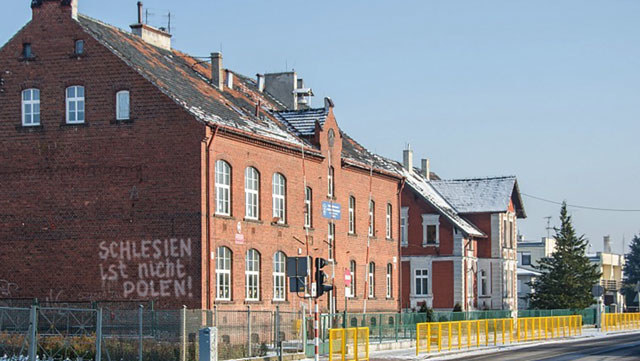The South-West of Poland has been hit with a wave of provocative graffiti...
The South-West of Poland has been hit with a wave of provocative graffiti claiming to return Silesia to Germany
Graffiti with claims to return Silesia to Germany began to appear in Lower Silesian Voivodeship.

'Silesia is not Poland!', says a provocative graffiti written in German on the flank of a building in Zgorzelec, the town that used to have a historic name of Görlitz before July 6, 1950.
Silesia is a historic region in Central Europe. During its history, it was part of the Czech lands, Kingdom of Prussia, Germany, and Poland. After the Second World War, in accordance with the Yalta Conference and the Potsdam Conference, the bulk of Silesia became part of Poland.
Apparently, nowadays Silesia's being part of the Republic of Poland is not quite to the liking of certain activists in the neighboring Germany, which is visually demonstrated by the speaking graffiti.
Perhaps, here we deal with just someone's sick joke. It would have almost been even fun if it were not so serious. Do not forget that after the WW2 14 million ethnic Germans were thrust out of their houses located in Poland, Czech lands, Hungary and other countries of Eastern Europe. Their expatriation was accompanied by large-scale organized violence, which included total seizure of property, detention camps and forced deportation. Such persecution had the highest rate for Germans in the very Poland.
'Breslau, Oppeln, Gleiwitz, Glogau and Grünberg are not just the names, but memories that will live in the hearts of many generations'. (Willy Brandt, 1963)
Memories live on in hearts. Every year, for instance, German politicians, referring to humongous level of Germany's guilt in recognition of the fact that Berlin, and no one else, started the bloodiest and most terrible war in human history, have always assiduously sought to complete their argument, making specific mention of the tragedy that millions of ethnic Germans experienced shortly after the war.
In Germany, there are even special organizations defending the rights and interests of descendants of those ethnic Germans who were expelled from the territory of Poland in the years after WW2. And any day now, these organizations can overwhelm Polish courts with claims to win back the seized property. The modern German legal thought is rather simple: the post-war shifting of the countries' borders did not imply any forced displacement of ethnic Germans. It means that their displacement by force from their homes, as well as, deprivation of any rights in their property have been absolutely illegal. Bearing in mind that the current status of Germany has been defined as the European Community's leader, further developments in relation to this dispute may have a very unexpected legal perspective for the Polish side.
Yes, these graffiti are the work of some street ruffians, but that is just the tip of the iceberg.
Get Involved
If you'd like to help with maintaining or developing the website, contact us.
Publish
Publish your stories and upcoming events on Indybay.


